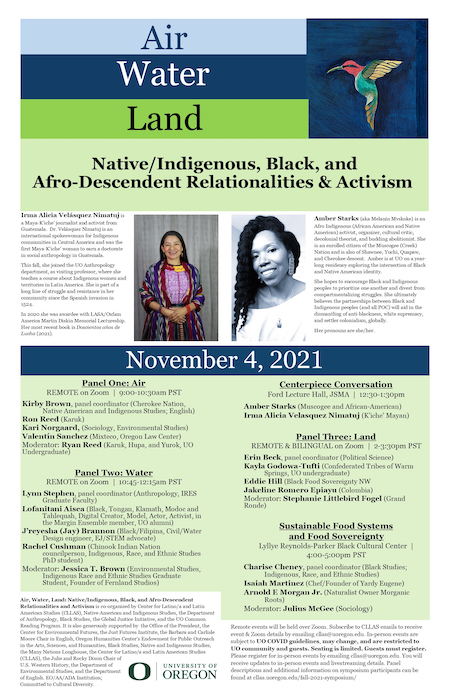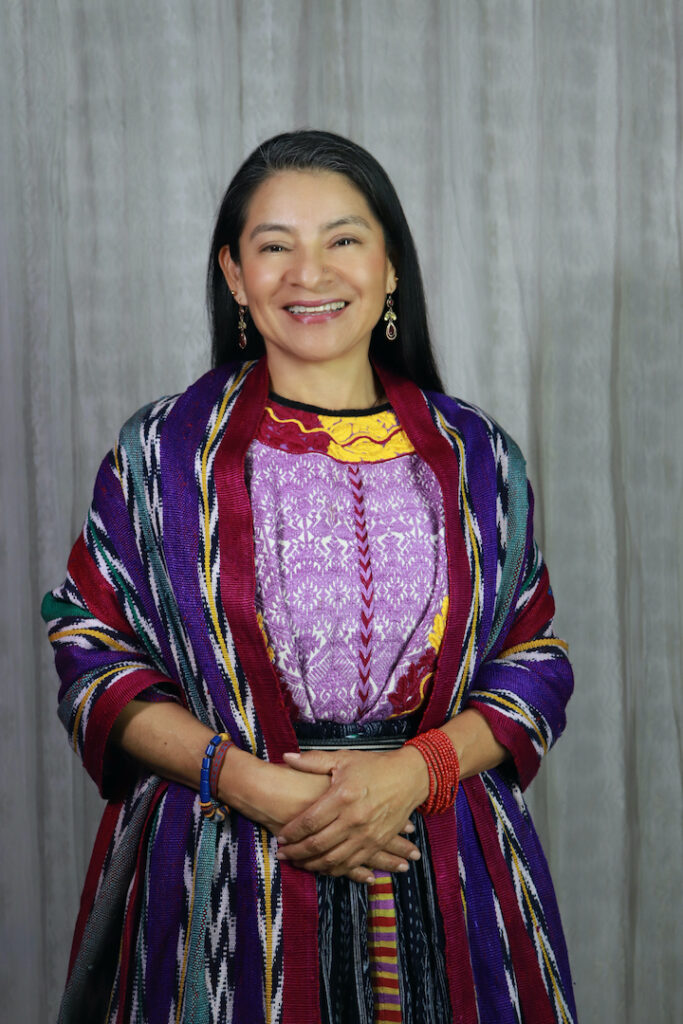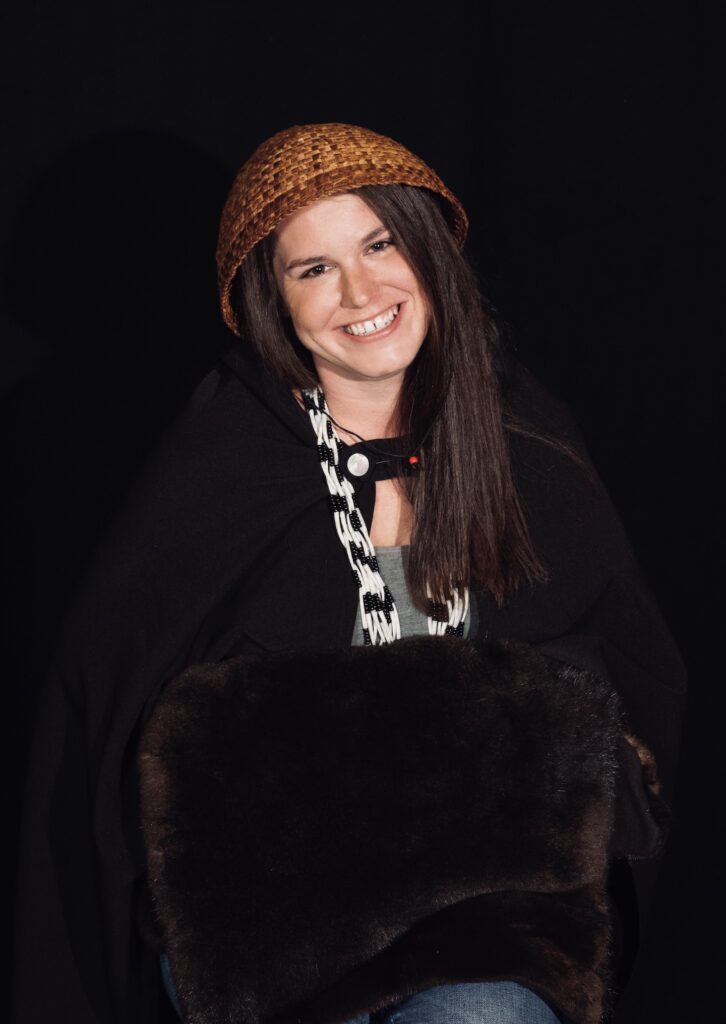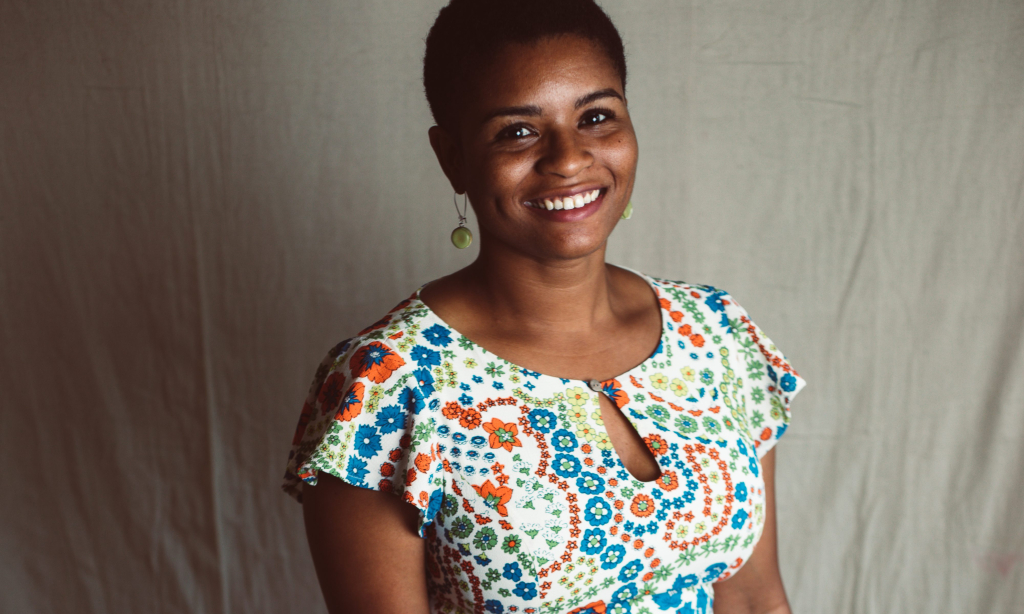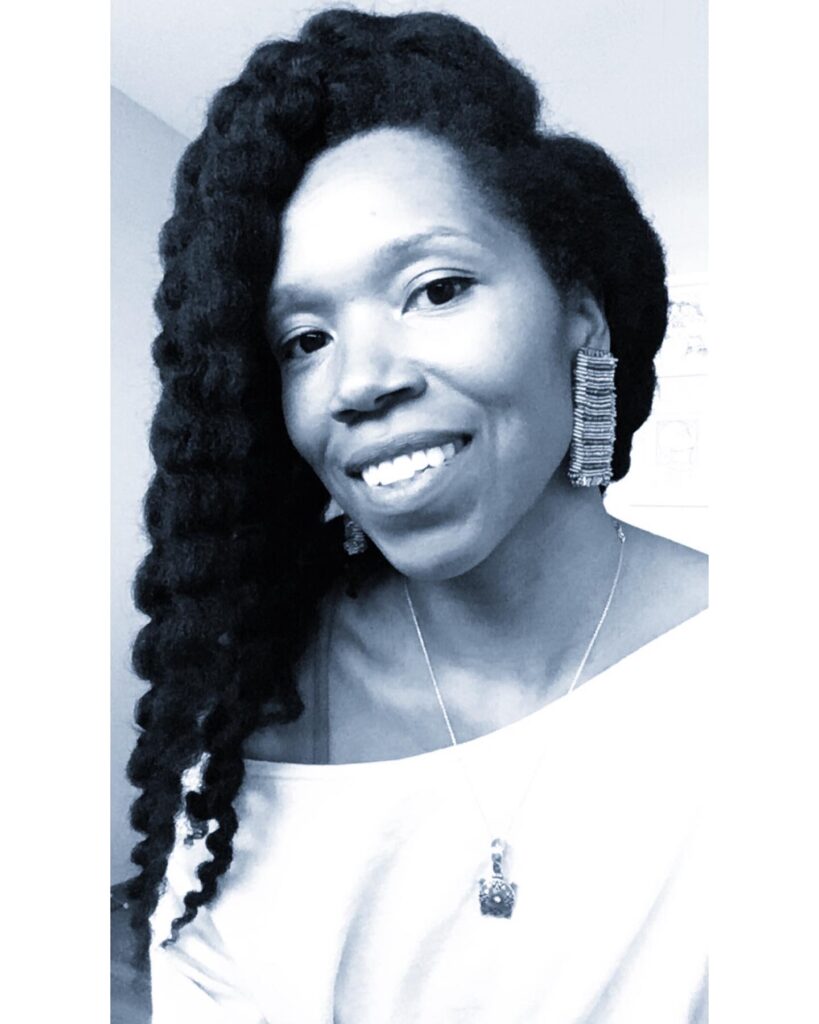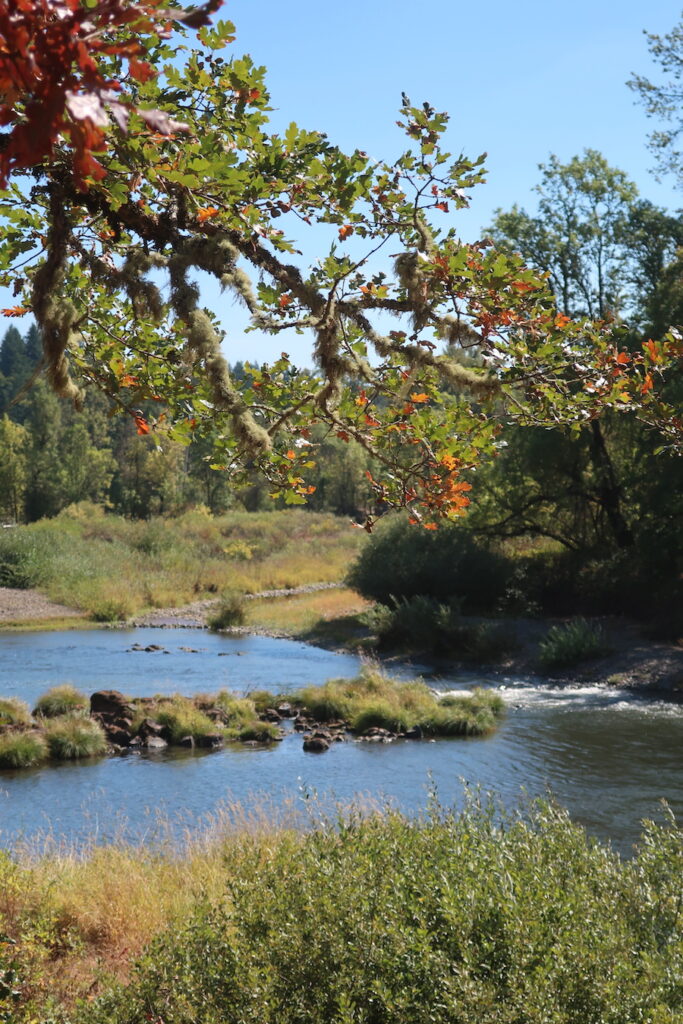Air, Water, Land
Native/Indigenous, Black, and Afro-Descendent Relationalities and Activism
November 4, 2021
Climate change, environmental racism, settler colonialism, white supremacy, patriarchy, north/south divides, and unequal access to basic environmental resources by communities of color have inspired ongoing environmental justice activism in the Americas. This Fall 2021 symposium will center Indigenous and Black voices, leverage the campus residencies of Maya activist and teacher Irma Alicia Velasquez Nimatuj (in residence through the Global Justice Initiative and the Department of Anthropology) and Muskogee/Creek artist and activist Amber Starks (in residence through the UO Common Reading program) and focus on environmental justice and sustainable food systems. Designed to foster critical conversations from Indigenous and Black/Afro-descendant communities across the Americas, this event is organized around themes of air, land, and water, with a committed focus to issues impacting local communities.
This symposium will feature three remote panels that explore these connections through air, land, and water, a keynote conversation, and a final discussion and demonstration of sustainable food systems. The event will be open to the public and is organized by the Center for Latino/a and Latin American Studies (CLLAS), Native American and Indigenous Studies, Anthropology, Black Studies, the Global Justice Initiative, and the Common Reading program of the University of Oregon.
Symposium Description in Spanish
Program
Nov. 4, 9-10:30 am | Panel One: Air
Remote
- Coordinator: Kirby Brown (Cherokee Nation, Native American and Indigenous Studies, English)
- Ron Reed (Karuk)
- Kari Norgaard (Sociology, Environmental Studies)
- Valentín Sanchez (Mixteco, Oregon Law Center)
- Moderator: Ryan Reed (Karuk, Hupa and Yurok, UO Undergraduate)
Panel Description: “When the last tree is cut, the last fish is caught, and the last river is polluted; when to breathe the air is sickening, you will realize, too late, that wealth is not in bank accounts and that you can’t eat money.”
–Alanis Obomsawin (Abenaki, Odanak Reserve), 1972
Catastrophic wildfires over the last decade, brought upon by never-before-seen droughts and heat events resulting from climate change and misguided resource management policies, have resulted in unprecedented devastation across the West. As human and other than human relations choke on fire, smoke, and ash, industrial agriculture, in its quest for ever-increasing yields and profits, drops toxic pesticides from the sky and spreads harmful chemicals on the land with massive ecological and human costs for all involved. Such contexts bring the urgency of Obomsawin’s now-50-year-old observation into sharp relief. Conceived broadly, this panel on “Air” centers the intellectual, cultural, and activist work taking place in Indigenous and agricultural labor communities to meet the urgency of these challenges and the existential realities of our present moment.
Nov. 4, 10:45-12:15 | Panel Two: Water
Remote
- Coordinator: Lynn Stephen (Anthropology, IRES Graduate Faculty)
- Lofanitani Aisea (Black, Tongan, Klamath, Modoc and Tahlequah, Digital Creator, Model, Actor, Activist, in the Margin Ensemble member, UO alumni)
- J’reyesha (Jay) Brannon (Black/Filipina, Civil/Water Design engineer, EJ/STEM advocate)
- Rachel Cushman (Chinook Indian Nation Councilperson, IRES Graduate Student)
- Moderator: Jessica T. Brown (Environmental Studies, Indigenous Race and Ethnic Studies Graduate Student, Founder of Fernland Studios)
Panel Description: Access to water and representation of BIPOC communities in water decision-making processes, water as part of Indigenous rights, decolonization, and the future of water in the state of Oregon, and connecting to water through art, film, and relationships to ancestors through ancestor fish, are some of the ways that panel participants will share their water advocacy and activism.
Nov. 4, 12:30-1:30pm | Centerpiece Conversation | Ford Lecture Hall, JSMA
- Activists, poets, and intellectuals Amber Starks (Muscogee and African-American) and Irma Alicia Velasquez Nimatuj (K’iche’ Mayan)
- Opening Song and Welcome, Jason Younker (Many Nations Longhouse, Asst. VP and Advisor to the President on Sovereignty and Government-to-Government Relations)
- Introduction by Chris Chávez, (Director of CLLAS; Journalism and Communication)
- Livestream: https://youtu.be/Qe9ZLBj_jNA
- Overflow venue: 220 Chapman
Nov. 4, 2-3:30pm | Panel Three: Land
Remote
- Coordinator: Erin Beck (Political Science)
- Kayla Godowa-Tufti (Confederated Tribes of Warm Springs, UO Undergraduate)
- Eddie Hill (Black Food Sovereignty NW)
- Jakeline Romero Epiayu (Colombia)
- Moderator: Stephanie Littlebird Fogel (Grand Ronde)
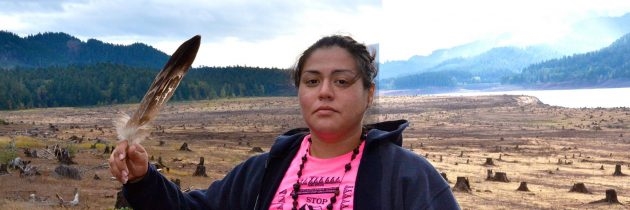
*Bilingual panel
Panel Description: This panel explores the vital relationship between BIPOC communities and land through a look at the Land Back movement and fight to defend local sacred sites in Oakridge, OR; community-based food systems and BIPOC food economies in the Pacific Northwest; and indigenous resistance to mining megaprojects and forced displacement in Colombia.
Nov. 4, 4-5:30pm | Sustainable Food Systems and Food Sovereignty | Lyllye Reynolds-Parker Black Cultural Center
- Coordinator: Charise Cheney (Black Studies, Indigenous, Race, and Ethnic Studies)
- Isaiah Martinez (Chef/Founder of Yardy Eugene)
- Arnold E Morgan Jr. (Naturalist Owner Morganic Roots)
- Moderator: Julius McGee (Sociology)
Panel Description: This panel is a conversation and Q&A with Isaiah Martinez and Arnold E. Morgan, Jr., African-descended local business owners who have a conscious and conscientious approach to sustainable food systems. Isaiah Martinez is the founder of Yardy Eugene, an Afro-Caribbean food cart that uses local and seasonal food to create dishes with African Diasporic influences. Arnold E. Morgan, Jr. founded Morganic Roots, a company that cultivates sustainable landscapes with a keen awareness of regenerative land practices and food production. Featuring drumming by the West African Cultural Arts Institute (WACAI).
Air, Water, Land: Native/Indigenous, Black, and Afro-Descendent Relationalities and Activism is supported by the Office of the President, the Center for Environmental Futures, the Just Futures Institute, the Barbara and Carlisle Moore Chair in English, Oregon Humanities Center’s Endowment for Public Outreach in the Arts, Sciences, and Humanities, Black Studies, the Center for Latino/a and Latin American Studies (CLLAS), Native American and Indigenous Studies, the Many Nations Longhouse, the Julie and Rocky Dixon Chair of U.S. Western History, the Department of Environmental Studies, and the Department of English.
The University of Oregon is located on Kalapuya ilihi, the traditional indigenous homeland of the Kalapuya people. Following treaties between 1851 and 1855, Kalapuya people were dispossessed of their indigenous homeland by the United States government and forcibly removed to the Coast Reservation in Western Oregon. Today, Kalapuya descendants are primarily citizens of the Confederated Tribes of Grand Ronde and the Confederated Tribes of Siletz Indians, and they continue to make important contributions to their communities, to the UO, to Oregon, and to the world.
Remote events will be held over Zoom. Subscribe to CLLAS emails to receive event & Zoom details by emailing cllas@uoregon.edu or at https://mailchi.mp/6cca8cf9e3c8/cllas-email-subscribers
In-person events are subject to UO COVID guidelines and may change. In-person events are restricted to UO community and guests; guests must register. Seating is limited. Please register for in-person events by emailing cllas@uoregon.edu.

